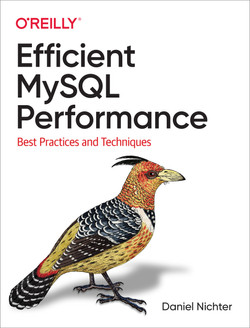Today, the book I would like to recommend is Efficient MySQL Performance – Best Practices and Techniques, Daniel Nichter, O’Reilly, 2021.
Best Practices and Techniques is a comprehensive guide to optimizing the performance of MySQL databases. Whether you’re a developer, database administrator, or system administrator, this book can provide valuable insights and techniques to help you improve the performance of your MySQL databases
I participated (just a little bit) in the writing of this book as technical reviewer with Vadim and Fipar. I really enjoyed that role of carefully reading the early drafts of the chapters Daniel was writing.
The author is an experienced MySQL expert who has years of experience in designing, managing, and optimizing MySQL databases. You can benefit from Daniel’s knowledge and expertise by reading this book.
Although Daniel says the book is not intended for experts, I think even experts will enjoy it because several key InnoDB concepts are also covered and well explained.
I myself, refer to the book often in some of my articles.
If you’re looking for information on transaction isolation and undo logs, fuzzy checkpointing, etc… you’ll find valuable information in the book.
The book is also enhanced with detailed illustrations that help understand complex concepts (InnoDB page flushing, page 216, Source to Replica, page 235, MVCC and undo logs, page 277 are some good examples of these illustrations).
Personally, I use this book as I used the 2nd and 3rd editions of High Performance MySQL.
From the beginning to the end of the book, Daniel focuses on the most important and measurable metric for all database consumers: query response time.
Overall, if you’re looking to improve the performance of your MySQL databases, Efficient MySQL Performance: Best Practices and Techniques is an excellent resource to have on your MySQL bookshelf.
